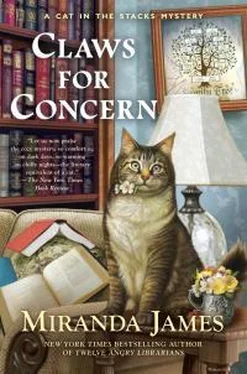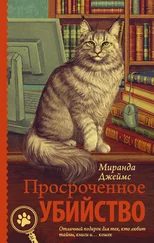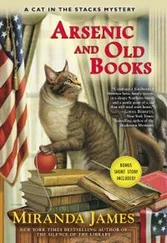“Diesel,” I replied.
Diesel sniffed Pemberton’s extended fingers, then butted his head against the man’s hand. He warbled, which was his sign of approval. Pemberton had passed one important test without knowing it. Diesel appeared to like him.
“Nice to meet you, too, Diesel,” Pemberton said as we continued into the staff area. I pointed the writer to a seat by the desk where I worked. Diesel remained near him while I made myself comfortable behind the desk.
I offered my guest a bottle of water, and he accepted. After he had a drink, he capped the bottle and set it on the floor by his chair.
“Thanks,” Pemberton said. “I know you have questions for me, but I thought I would start by giving you a more detailed description of the project I have in mind.”
I nodded. “Yes, please do.”
Diesel meowed, and the writer chuckled. “I guess your assistant is ready to hear more about it, too. I know you met a good friend of my wife’s and mine on Sunday, Ernie Carpenter.” After I nodded again, he continued, “I’m sure Ernie mentioned that Wanda Nell, my wife, and I also have some experience as amateurs involved in murder investigations. Wanda Nell and I haven’t sought publicity for our part in these cases before now, and we’re still not. I believe you said you had read one of my books?”
“Yes, Hell Has No Fury ,” I replied. “I thoroughly enjoyed it. I have to say that it was the first true crime book I’ve ever read. You write well, and I liked the fact that you didn’t sensationalize the truly tragic aspects of the case the way other writers might have done.”
“Thank you.” Pemberton smiled. “I think the facts in these cases are dramatic enough in themselves, and reporting them is enough to make the point. My approach is the same in each of the books I’ve written so far, and I don’t plan to deviate from that. Based on my research into some of the cases here in Athena, I’d say the facts of them are pretty dramatic, so they don’t need embellishment. The same is true of the cases Wanda Nell and I have been involved with.”
My take thus far on Jake Pemberton was that he was a forthright, down-to-earth person. A stand-up guy , to use Helen Louise’s term. I thought him sincere in what he said about his work and his approach toward it. Because of this, I felt more relaxed with him. My reservations about participating in the project had begun to waver.
Pemberton reached for his bottle and drank more water. “What I propose to do—and, of course, my publisher would have to approve, or I won’t be doing the book—is write about these cases and bring in the aspects of how amateur sleuths assisted the police. I’d like to write about two or three of them per book.”
“So you’re thinking of a series of books, then,” I said.
“Yes,” Pemberton said. “All these cases are interesting, but they’re not the long, drawn-out kind that I’ve written about before. I don’t think they need the full-length-book treatment.”
“That makes sense,” I said. “I have to say that I find your approach to this interesting. My only real concern in this is that I don’t want to find myself in the spotlight afterward. I don’t want the attention this could bring.”
“Understood,” Pemberton replied. “Wanda Nell and I don’t want that kind of attention, either. For that reason I am not intending to use real names. I would give you a pseudonym, just like I will be giving myself and my wife.”
“That’s fine, up to a point,” I said. “But there will be people who read the books who will recognize the cases, of course. They might also know enough to recognize the real identities of the amateurs involved.”
“That’s true,” Pemberton said. “I can’t do anything about that, so there is still a risk involved. There is another issue, though, that could affect this project. I don’t know about the attitude of local law enforcement in Athena, but in Tullahoma I know they’re not going to be eager to acknowledge the roles that Wanda Nell or I might have played in bringing the killers to justice. They want the credit for that, and for the most part, I think they deserve it.”
“I agree with you on that,” I said. “Chief Deputy Berry, who is the chief homicide investigator here, is a smart, capable officer. We haven’t always gotten along well, but we managed to work out our differences. I wouldn’t want her to think that I suddenly decided I wanted all the credit for the work she and her officers have done in the past.”
“I understand,” Pemberton replied. “And the same for me and my wife. This project has a number of hurdles, and I have to see if I can get over them before it can go forward. I haven’t broached the idea with my agent and my editor yet, and they could very well tell me not to go forward with it.”
Until now I’d had the impression that Pemberton was ready to get started, once he had my permission. Frankly I was relieved to hear that not everything was settled yet.
“What do you think?” the writer asked. “Will you cooperate with me, if I get the go-ahead on this?”
I hesitated before I replied. “I have to be honest with you. I’m still uneasy over the situation, but if you can get the go-ahead from Chief Deputy Berry, then I will participate, too.”
Pemberton smiled. “Thank you, Mr. Harris. I’m delighted to have you on board. Luckily I was able to arrange a meeting with the chief deputy for this afternoon. I have some time to kill. Could I treat you to lunch?”
“Thank you, that’s kind of you, but I brought my lunch today,” I said. “I’ll be working here until three. If you need a recommendation for a place to eat, I can recommend the French bistro on the square.” I rose from my chair.
Pemberton stood. “I’ve eaten there before. Great food. Thanks for reminding me.” He extended his hand again, and we shook.
“Let me walk out with you,” I said. Diesel accompanied us.
“I’ll be in touch,” Pemberton said when we neared the door. He gave Diesel a couple of pats on the head before he exited.
“Nice guy,” I said, and Diesel warbled. “Come on, time for lunch.” I turned back toward the staff area, but we had moved only a few steps before Bill Delaney approached me.
“Sorry to bother you,” he said. “Can we talk somewhere private for a few minutes?” He looked away, then his gaze focused on me again. He had his hands shoved into his pants pockets.
I wondered what was making him so uneasy. “Sure, come on back with me.” Diesel trotted ahead, and I guided Delaney to the work area. “Have a seat, and tell me what’s on your mind.” I indicated the chair that Jack Pemberton had vacated only a few minutes ago.
Delaney nodded and removed his hands from his pockets. He perched on the edge of the chair, and I could see he was still uneasy about something. Diesel came to sit by my legs behind the desk. I think he had picked up on Delaney’s emotional state, and it was making him a little uneasy, too.
Delaney looked at me for a moment, then stared down at his hands. He didn’t look up when he began to speak.
“I found out that you live in that house,” he said. “The one I asked about that used to belong to Delbert Collins.” He raised his head, and I could see that he was confused.
“Yes, I do,” I said. “My aunt was married to Delbert Collins, and that was their home. When she died, she left it to me.”
Delaney nodded. “Figured you might be kin some kind of way to one of them.”
“I didn’t tell you before,” I said, “because frankly I wasn’t sure what your reason was for being so interested in the house.”
“I understand,” Delaney replied. “I’ll tell you why now. Delbert Collins was my father.”
Читать дальше












